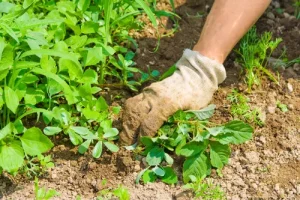You can garden all year round, but depending on the season you will have to do things differently. By working waste-free, you can keep your garden sustainable and environmentally friendly all year round. The goal of zero-waste gardening is to reduce waste, reuse items and make the most of natural resources. This method is better for the soil and makes your garden healthier and more productive. Here are some planting tips for every season so you can keep your garden waste-free all year round.
Spring Gardening Tips
In the spring the plants grow and look better. As the weather warms and plants emerge from hibernation, it is important to prepare your garden for the growing season. First, remove any debris that has accumulated over the winter. Don’t throw away this organic stuff; add it to your compost pile. Compost is an important part of zero-waste gardening because it turns dead plants into nutrient-rich soil.
When you start planning your garden’s layout, keep in mind that crop rotation and planting ideas can work well together. These habits keep the soil from drying out and repelling pests, meaning you don’t have to use as much fertilizer and pesticides. Grow a range of foods to build resilience and biodiversity.
To start seeds indoors, use seed pots made from newspaper, toilet paper rolls or naturally decomposing egg cartons. Because they can be planted directly in the ground, they use less plastic than standard seed trays. To save water, use collected rainwater or gray water to water your seedlings.
Summer Gardening Tips
Many plants grow best in summer, but this can be difficult due to factors such as heat and drought. Using mulch is a great way to keep the soil moist, suppress weeds and keep the soil at the right temperature. Use mulch made from natural materials such as grass clippings, straw or leaves. Over time they break down and improve the soil.
Use drip irrigation to quickly provide plants with the water they need. This method delivers water directly to the roots, resulting in less water evaporation and loss. You can create a simple drip irrigation system by poking small holes in the sides of used plastic bottles and burying them near the roots of your plants.
Regularly harvesting herbs and vegetables encourages them to continue growing and prevents them from going to waste. Excess food can be stored for a long time by freezing, canning or drying. Don’t let food go to waste; give extra harvests to friends, neighbors or food banks in your area.
Monitor pests and diseases in your garden and use natural and organic methods to eliminate them. By making insecticidal soap at home, using neem oil, and growing pest-resistant plants, you can repel pests without using harmful chemicals. Planting different types of flowers and providing a habitat, such as an insect house, can attract beneficial insects such as ladybugs and bees.
Garden Tips for Autumn
Autumn is a time of change as the garden prepares for winter. Now is the time to pick the last of the summer crops and plant foods that grow better in cooler weather, such as kale, spinach and garlic. Save the best seeds for next year’s plants. Seed saving is a waste-free activity that maintains plant diversity and reduces dependence on commercial seed suppliers.
Start winterizing your garden by adding a layer of compost or well-rotted manure to the soil. This improves soil structure and adds nutrients, preparing it for spring growth. You can mulch them with leaves or add them to the waste pile. Over time, the leaves will decompose into organic matter that is beneficial to your land.
Ground covers, also known as ‘green manures’, are an excellent way to keep your land safe and healthy over the winter. In unused garden beds, plants cover crops such as vetch, clover or rye. When these crops are buried in the ground in the spring, they add nutrients to the soil and prevent it from washing away.
Winter Gardening Tips
Even though your garden may be quieter in the winter, there are still many ways to keep your garden healthy, productive and waste-free. Make a bell jar from recycled plastic bottles or old glass jars to cover fragile plants and protect them from frost. You can remove these covers during the day to let in the sunlight and cover them at night to keep the cold out.
Use winter to make plans in preparation for the upcoming growing season. Take a look at how your garden performed last year and write down what worked well and what could have been better. To have a great year, plan the layout of your garden, when to start planting and how often to rotate crops.
You can also keep your garden tools and equipment in good condition and repair them during the winter. Clean and sharpen pruners and shovels, and check the irrigation system for leaks. If you properly maintain your tools, they will last longer and you will have to buy fewer new tools, which is in line with the zero-waste philosophy.
You can compost food scraps and garden waste all winter long. In cold weather the composting process slows down, but the organic waste will still decompose and be available for use in the spring. Covering the compost pile with a tarp or adding a layer of straw can retain heat.
General Tips for Waste-free Gardening
When it comes to zero-waste farming, there are some general rules to remember, regardless of the time of year. If you can, always try to reuse, recycle and reduce the number of items you use. Use things in your garden around the house in new ways. For example, make planters from old containers or make fences from scrap wood.
Apply permaculture concepts to the way you plant your garden. By replicating natural ecosystems, permaculture attempts to create systems that are sustainable and self-sufficient. Some examples include planting with other plants, using materials that can be used again and again, and creating gardens that work with nature rather than against it.
Plant many different species, including native plants that help nature in your area, to increase biodiversity. Pests, diseases and weather changes are less likely to harm a garden with a variety of different plants. Additionally, it provides a habitat for friendly insects, birds and other animals.
Finally, learn about zero-waste farming techniques and teach others how to do it. Discuss what you know with gardening friends, family and other gardeners to increase understanding and empower people to garden in a more environmentally friendly way.
Conclusion
Seasonal, zero-waste gardening means changing the way you do things based on what your garden needs at different times of the year. By using soil, compost, water, seeds and materials multiple times, you can create a long-lasting and productive garden while using as few resources as possible. These habits are not only good for the environment, but they will also make your garden healthier and more efficient. If you’re willing to put in some work and get creative, you can enjoy the benefits of zero-waste gardening all year round.
FAQs
1. What are some natural ways to keep pests away from my plants?
To get rid of pests, use natural and organic methods such as garlic spray, homemade insecticidal soap, and neem oil. Plant flowers and provide insect habitats, such as insect hotels, to attract beneficial insects such as ladybugs and bees. When you plant plants next to each other, some plants repel pests and others bring in beneficial insects.
2. Explain what cover crops are and how they can help my garden.
Plant some plants out of season to improve the health of the planet. These are called cover crops or green manures. They prevent the soil from washing away, suppress weeds and add organic matter to the soil when turning. Cover crops include grass, rye and vetch. They improve the structure and fertility of the soil and prepare your garden for the next growing season.
3. How to make your own garden tools?
You can make your own farming tools with items you have at home. For example, you can use old plastic bottles to make a watering can or drip irrigation system. Used broken pots, wooden popsicle sticks or plastic containers can all be used to make plant labels. For extra comfort, turn an old foam or yoga mat into a patio kneeler.
4. What does it mean to save seeds? Why is it important?
When you save seeds, you save the seeds in your plants for later growing seasons. It reduces your dependence on commercial seed suppliers, protects plant varieties and ensures you have seeds that grow well in your environment. Store seeds from the best plants in a cool, dry place.
5. What can I do to keep my garden in good condition during the winter?
Used cloches made from recycled plastic bottles or glass jars can protect delicate plants from frost. Continue composting garden waste and food scraps. Assessing how your garden performed last year and noting what could have been done better can help you plan and prepare for the next growing season. Repair and maintain your garden tools so they last longer and are ready for use in the spring.


